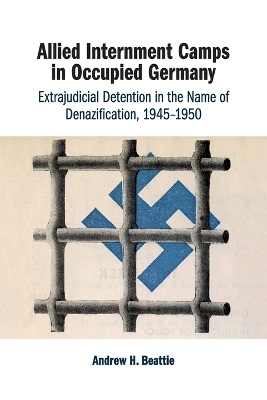
Allied Internment Camps in Occupied Germany
Extrajudicial Detention in the Name of Denazification, 1945–1950
Seiten
2021
Cambridge University Press (Verlag)
978-1-108-72073-1 (ISBN)
Cambridge University Press (Verlag)
978-1-108-72073-1 (ISBN)
This first in-depth study of Allied internment compares the detainment of Germans by all four occupying powers in the post-war period. It challenges common assumptions about divergent western and Soviet approaches to detainees, revealing how the process of denazification was more complex and severe than previously believed.
Between 1945 and 1950, approximately 130,000 Germans were interned in the Soviet zone of occupied Germany, including in former Nazi concentration camps. One third of detainees died, prompting comparisons with Nazi terror. But what about the western zones, where the Americans, British, and French also detained hundreds of thousands of Germans without trial? This first in-depth study compares internment by all four occupying powers, asking who was interned, how they were treated, and when and why they were arrested and released. It confirms the incomparably appalling conditions and death rates in the Soviet camps but identifies similarities in other respects. Andrew H. Beattie argues that internment everywhere was an inherently extrajudicial measure with punitive and preventative dimensions that aimed to eradicate Nazism and create a new Germany. By recognising its true nature and extent, he suggests that denazification was more severe and coercive but also more differentiated and complex than previously thought.
Between 1945 and 1950, approximately 130,000 Germans were interned in the Soviet zone of occupied Germany, including in former Nazi concentration camps. One third of detainees died, prompting comparisons with Nazi terror. But what about the western zones, where the Americans, British, and French also detained hundreds of thousands of Germans without trial? This first in-depth study compares internment by all four occupying powers, asking who was interned, how they were treated, and when and why they were arrested and released. It confirms the incomparably appalling conditions and death rates in the Soviet camps but identifies similarities in other respects. Andrew H. Beattie argues that internment everywhere was an inherently extrajudicial measure with punitive and preventative dimensions that aimed to eradicate Nazism and create a new Germany. By recognising its true nature and extent, he suggests that denazification was more severe and coercive but also more differentiated and complex than previously thought.
Andrew H. Beattie is Senior Lecturer in German and European Studies at the University of New South Wales, Sydney. An authority on the politics of history and memory in Germany, he is the author of Playing Politics with History: The Bundestag Inquiries into East Germany (2008).
Introduction; 1. 'It will be desirable on political grounds': the development of internment policy, 1943–1946; 2. 'Not consistent with civil liberties': internment in practice, 1945–1950; 3. Internees: the 'worst Nazis' or a 'colourful assortment'?; 4. Internment camps: 'the main task of the camp is the complete isolation' of the detainees; Conclusion;
| Erscheinungsdatum | 23.08.2021 |
|---|---|
| Zusatzinfo | Worked examples or Exercises; 4 Tables, black and white; 1 Maps; 1 Line drawings, black and white |
| Verlagsort | Cambridge |
| Sprache | englisch |
| Maße | 151 x 229 mm |
| Gewicht | 390 g |
| Themenwelt | Geschichte ► Allgemeine Geschichte ► Zeitgeschichte |
| Geisteswissenschaften ► Geschichte ► Regional- / Ländergeschichte | |
| Sozialwissenschaften ► Politik / Verwaltung | |
| ISBN-10 | 1-108-72073-0 / 1108720730 |
| ISBN-13 | 978-1-108-72073-1 / 9781108720731 |
| Zustand | Neuware |
| Haben Sie eine Frage zum Produkt? |
Mehr entdecken
aus dem Bereich
aus dem Bereich
Gewalt, Umwelt, Identität, Methode
Buch | Softcover (2024)
Spector Books OHG (Verlag)
CHF 49,95
wie Freud im Kollektiv verschwand
Buch | Hardcover (2024)
Klett-Cotta (Verlag)
CHF 34,95


